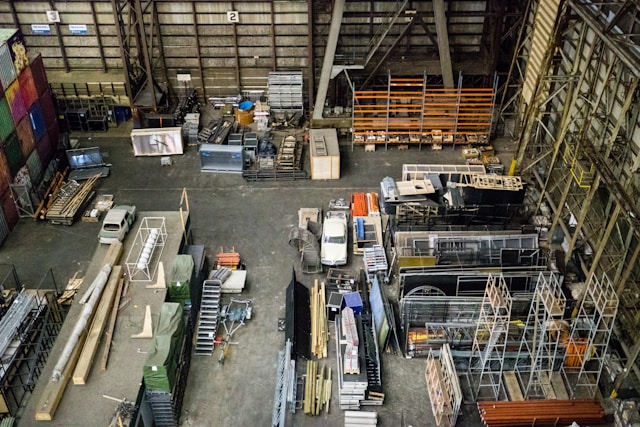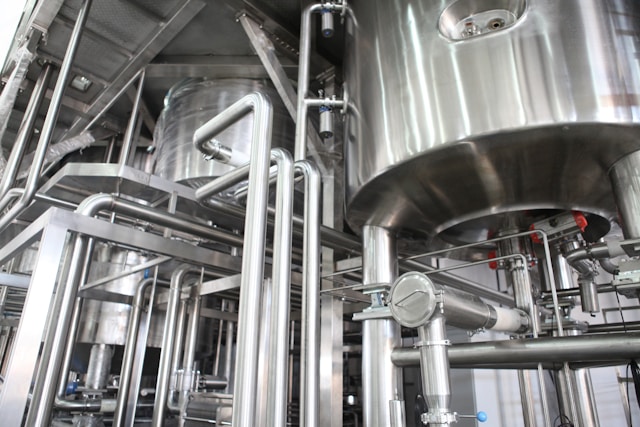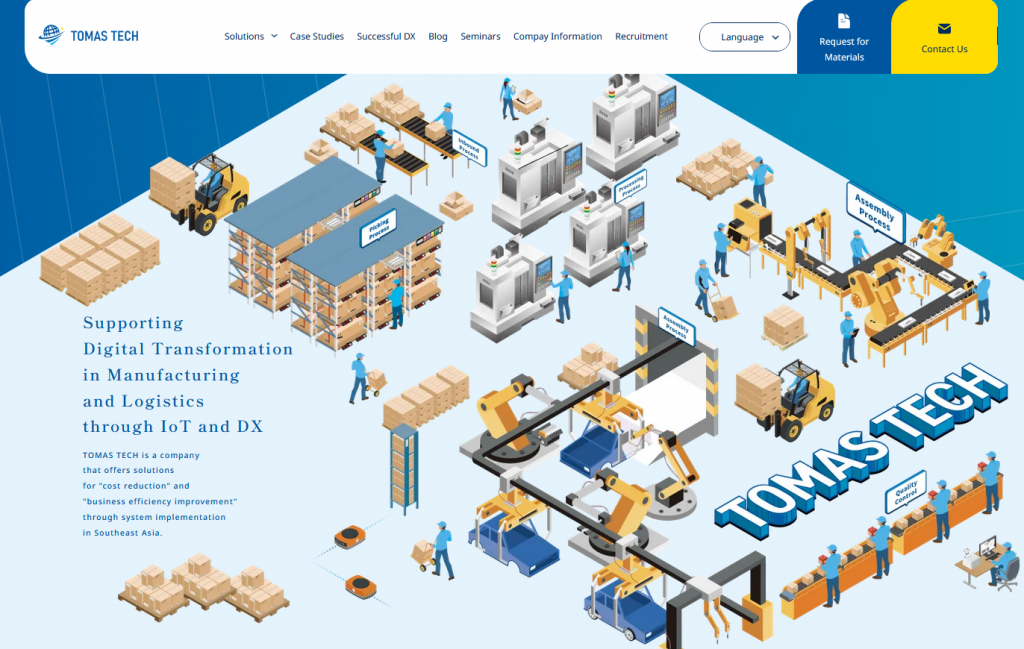Are you interested in offshore system development but feel uneasy about outsourcing to Thailand? An increasing number of Japanese companies’ IT departments and DX promotion teams are developing and implementing business systems locally in Thailand.
However, outsourcing to overseas companies with different languages and cultures often raises concerns such as, “Can we accurately convey our specifications?” or “Will post-development support be adequate?”
This article explains the key points to know before outsourcing system development in Thailand. We will sequentially introduce the benefits and precautions of local development, common challenges and their solutions, and how to choose a partner company. Finally, we will also explain the strengths of TOMAS TECH, which supports both from Thailand and Japan.
Please feel free to contact us regarding system development in Thailand.
Reasons Why More Companies Are Developing Systems Locally

Why are many companies focusing on local system development in Thailand? The main reasons can be broadly categorized as follows:
- Cost advantages and securing talent
- Cultural affinity and ease of working
- Geographical proximity and minimal time difference
Thailand offers lower labor costs for engineers compared to Japan, allowing for high-quality development even with limited budgets. While Japan continues to face a severe shortage of engineers, leveraging skilled overseas talent can help resolve resource shortages.
Additionally, Thailand is known for its pro-Japanese sentiment and deep understanding of Japanese culture and business manners. This reduces the likelihood of communication mismatches and facilitates a collaborative environment.
The time difference between Japan and Thailand is only two hours, making real-time communication easier and enabling prompt responses to sudden specification changes or issues. Traveling is also convenient, allowing for face-to-face meetings locally when it’s necessary.
Thus, from cost reduction to speedy responses, system development in Thailand offers various benefits. It’s understandable that more companies are opting for local development.
Common Challenges in System Development in Thailand

Despite the many advantages of system development in Thailand, several challenges are also pointed out. Proceeding without adequate preparation may lead to unexpected failures. Here, we explain three representative challenges:
Difficulty in Conveying Specifications
Accurately conveying your requirements to development teams from different language and cultural backgrounds is not easy. Specifications that are standard in Japan may not be implemented unless clearly communicated.
Documents alone are insufficient; direct communication is necessary to share details and avoid misunderstandings, which could result in a system that doesn’t meet expectations. Language barriers often cause discrepancies, so it’s essential to explain technical terms and industry-specific expressions in simpler terms.
Weak Post-Development Maintenance and Operation Support
System implementation doesn’t end at delivery; support during the operation and maintenance phase is crucial. When outsourcing to overseas development companies, the speed and quality of support for bug fixes and feature additions post-release are significant concerns.
Although the time difference is minimal, the physical distance remains, and if Japanese language support isn’t available during issues, problem resolution may take longer. To alleviate such concerns, it’s important to clearly define maintenance service contents in the contract and choose a company with a reliable support system.
Insufficient Understanding of Business Operations, Leading to Mismatches
Proceeding with development without a thorough understanding of on-site workflows and industry-specific practices may result in a system that doesn’t align with actual operations.
Especially in specialized fields like manufacturing and logistics, failing to grasp business processes accurately can lead to inappropriate functionality. Without deep business understanding, there’s a risk of creating a “functional but unusable system,” making pre-development business analysis and requirement alignment crucial.
If you’re facing on-site challenges, please consult with TOMAS TECH.
Three Criteria for Choosing a System Development Company in Thailand

When selecting a development partner in Thailand, what points should you focus on? To avoid failure, it’s essential to evaluate candidate companies based on the following three criteria:
Japanese Language Support and Careful Requirement Definition
It’s important to have staff who can communicate in Japanese. Conducting requirement definitions and meetings in Japanese allows for accurate transmission of subtle nuances. Even if communication is in English, choose a company with established contact frequency and reporting systems.
Local Development Base and Japanese Contact Point
Selecting a company with extensive development experience and familiarity with your industry provides peace of mind. For instance, a company experienced in manufacturing systems can propose necessary functions without detailed explanations. Check past implementation cases to see if they have experience with Japanese company projects.
Experience in Business Understanding and DX Support
Post-development maintenance systems are also crucial selection criteria. Ensure they can promptly respond to issues and feature additions after delivery and that inquiries can be made in Japanese. Clearly define the scope of support in the contract to handle operational troubles calmly.
TOMAS TECH’s Strengths: Seamless Support from Thailand and Japan for Successful Development

As a development partner in Thailand, TOMAS TECH is a reliable choice. With a base in Bangkok and extensive experience supporting system implementations for Japanese companies, the company acts as a bridge between Thailand and Japan.
One-Stop Support from Requirement Definition to Maintenance
TOMAS TECH provides comprehensive support from consulting proposals to system implementation and after-sales support. We conduct careful hearings in Japanese during requirement definitions and accurately convey intentions to the local development team, addressing the challenge of “difficulty in conveying specifications.” Furthermore, a dedicated team continues to support the system after delivery, ensuring peace of mind during the operation phase.
Extensive Experience in Supporting DX in Manufacturing and Logistics
With a track record of serving clients in manufacturing and logistics, TOMAS TECH excels in developing systems that visualize operations and improve efficiency. They have handled numerous solutions like inventory management systems and traceability systems that are “fully utilized on-site.” Such DX support expertise prevents mismatches in business understanding and enables optimal proposals.
Additionally, Japanese managers and local staff work closely together, providing meticulous support that bridges language and cultural gaps. With TOMAS TECH, you can eliminate common concerns in system development in Thailand and strongly support the DX promotion of Japanese companies. Even those new to offshore development can proceed with projects confidently, thanks to dual support from Thailand and Japan.
If you’re considering system development in Thailand, feel free to contact TOMAS TECH.
Frequently Asked Questions About System Development in Thailand

Here are answers to common questions about system development in Thailand:
A: Many companies offer Japanese language support. Especially, Japanese system development companies or local companies with Japanese staff can communicate in Japanese.
Even if Japanese isn’t available, using interpreters or confirming details in English can prevent misunderstandings. The key is to avoid recognition gaps due to language barriers. Confirm Japanese support availability before contracting and consider using bridge SEs if necessary.
A: Absolutely. Some companies support from the phase of organizing issues through business hearings and translating them into systems. In fact, consulting from that stage allows for more efficient design.
A: Having a local base offers advantages like easier on-site response during troubles and continuous follow-up. Consider not only costs but also post-operation peace of mind when choosing.
A: For short-term implementation and low cost, packages are suitable; for flexible functions tailored to business needs, scratch development is preferable.
Each has pros and cons, so it’s recommended to consult a company that can propose based on “purpose, budget, and timeline.”
Conclusion: The Keys to Successful Local Development in Thailand Are “Communication and Business Understanding”
System development in Thailand offers significant advantages in terms of cost reduction and development speed. However, there are challenges, such as language and cultural barriers, as well as insufficient understanding of business operations. These issues can be overcome with thorough preparation and choosing a trustworthy partner.
The keys to success are “clear communication” and a “deep understanding of business operations“.
Maintaining close communication with the local development team to consistently clarify and resolve any misunderstandings, and ensuring they deeply understand your company’s processes and goals before proceeding with development, are shortcuts to project success.
Many Japanese companies have already embarked on local development in Thailand and achieved impressive results. By keeping these key points in mind, you can overcome concerns about overseas development and acquire a system that significantly contributes to your company’s DX initiatives. We encourage you to positively consider system development in Thailand, using this article as your guide.


